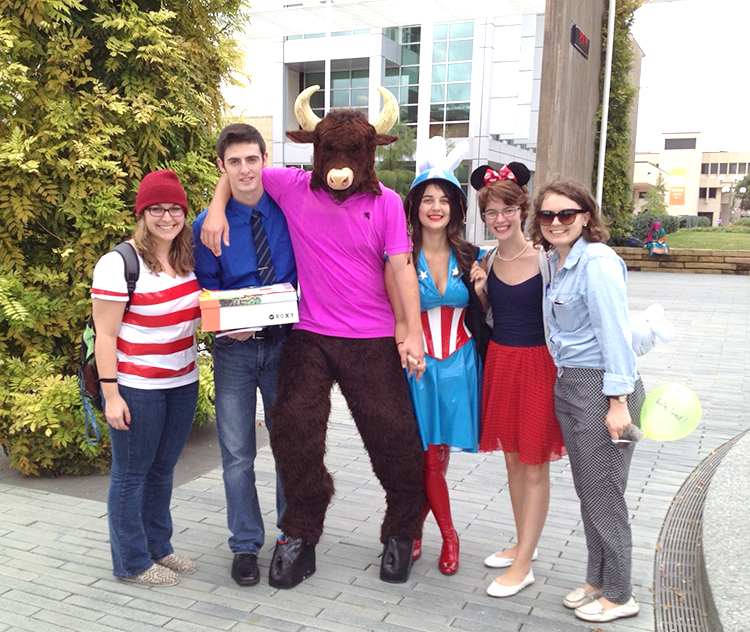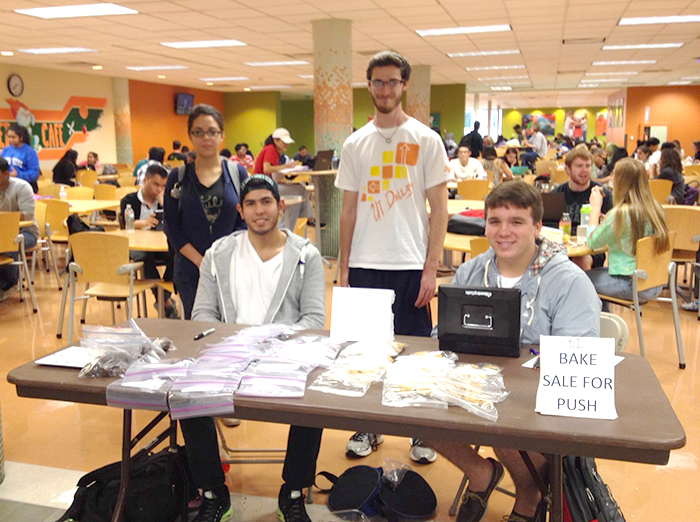
Freshmen dressed up and collected funds for UNICEF as part of a project for their Freshman Year Experience course. Project members are: (from left) Lindsay Nussbaum, Vinchenzo Locascio, Augustus Strickland, Erin Derocher and Katherine Risor, with advisor Tessa Thibodeau.
Advisors in the School of Arts and Humanities admitted they had some misgivings about asking freshmen to develop and organize a class volunteer project entirely on their own.
The project was assigned as part of Arts and Humanities (ARHM) 1100 and University (UNIV) 1010, courses in the Freshman Year Experience program that teaches freshmen how to succeed at UT Dallas. Both courses are required for all arts and humanities freshmen.
Dr. Shelley Lane, associate dean for undergraduate education in the School of Arts and Humanities, and Megan Gray, assistant director for the humanities, are ARHM 1100 instructors who developed the volunteer project and worked with advisors who teach UNIV 1010 to integrate the assignment into their sections.
On the one hand, advisors said it was important for students to take initiative, especially when it involves serving others. But would these new students be realistic in the scope of their projects and think of all the details needed for a successful outcome?
“I learned how to take a total step back,” said academic advisor Tessa Thibodeau. “I wanted to push them at times, but I was definitely surprised with how it turned out.”

(From left) Arts and Humanities freshmen Desi Alicea-Aponte, Andy Garcia, Alan Piper and Marc Forestier sold baked goods to raise $56 for Push America, which provides playground equipment for children with disabilities.
Students came through – and then some. Working in their UNIV 1010 groups of about 20 students, they planned the logistics for an on-campus project during a single class session. For their project, they branched out across campus to sell baked goods, organized games for charity and collected canned goods for needy students.
Some danced for charity. Others took “selfies” – photos of themselves posted to social media venues – showing them donating cash or goods to encourage others to also give. Still others dressed up in Halloween outfits to draw attention to their cause.
All the money and goods collected went to a charity of their choice, from UNICEF to Comet Cupboard. In early November, students shared the results in class.
Arts and Technology (ATEC) freshman Audon Archibald said his UNIV 1010 section helped organize a “nerdy tournament” of video games, which raised $84 for Child’s Play, an international game industry charity that provides toys and games to hospitalized children.
“After we played the games, we ended up sitting around talking, sharing trading cards, eating cupcakes – and paying for it,” Archibald said.
“I gave them very little direction. We’re always using the phrase ‘Own your academic plan.’ This showed they can really do it.”
Bobby Frye,
ATEC and EMAC undergraduate advisor
Michael Burdick said his group set up a table in the Comet Cafe in the Student Union to collect donated nonperishable items for Comet Cupboard, a food pantry initiative at UT Dallas that helps students in need.
“We took donations of food, and a little stuff added up together for a worthy cause,” said Burdick, an ATEC student.
Freshmen enrolled in ARHM 1100 learn about the School of Arts and Humanities’ intellectual and cultural environment through lectures, group projects, activities, guest panels, and by attending artistic and cultural events. They also learn about the school’s majors, research opportunities, careers and internships.
Lane said the volunteer component of the class was added to help students learn to solve problems, work to improve lives and feel more connected on campus.
“The more engaged a student is in campus life, the more they will persist through to graduation,” Lane said.
ATEC and EMAC undergraduate advisor Bobby Frye said it was interesting to see students take charge of the project.
“I gave them very little direction,” Frye said. “We’re always using the phrase ‘Own your academic plan.’ This showed they can really do it.”